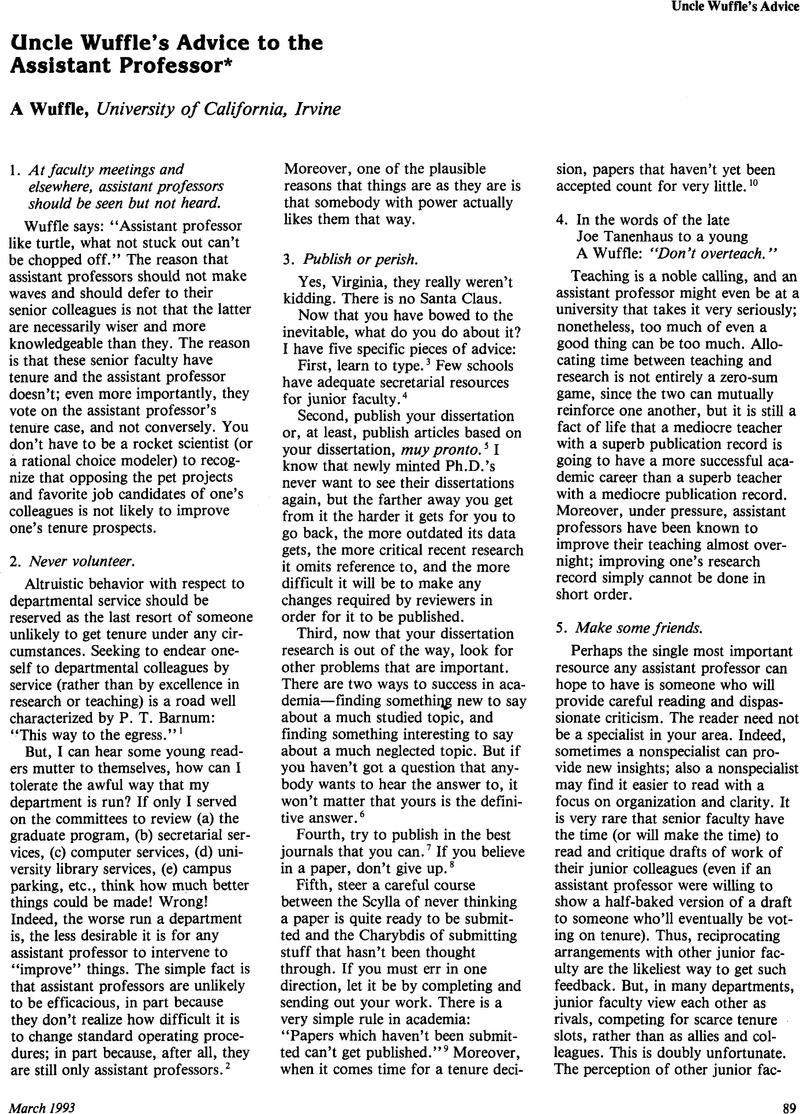Published online by Cambridge University Press: 02 September 2013

This is a companion piece to “Uncle Wuffle's Advice to the Advanced Graduate Student,” PS (December, 1989), 838-39. A Wuffle is Assistant to Professor, School of Social Sciences, University of California, Irvine. He is best known for such seminal articles as “The Pure Theory of Elevators,” Mathematics Magazine 55 (January 1982): 30-37; “Should You Brush Your Teeth on November 6, 1984,” PS (Summer 1984), 577-80; and “Pig and Proletariat,” San Jose Studies (1990): 5-39 (written under a pseudonym). He is currently at work on a series of essays on empirically insightful tautologies.
1. Of course, this does not mean that an assistant professor ought not to do a “fair share,” of for that matter, a bit more—since one's notion of a fair share and that of one's senior colleagues may differ.
2. Moreover, even in the unlikely event that change for the better occurs, its likely pace is so glacial that unless assistant professors have tenure they won't be around long enough to benefit from the change.
3. Get a MacIntosh. Even a moron can learn to do word-processing on a Mac. I did.
4. Alternatively, be prepared to spend a substantial portion of your salary getting your papers professionally typed. That's what I did when first starting out.
5. Preferably do both, since books and journal articles are read by somewhat different audiences and serve different purposes.
6. There are two fundamental problems in research: not having enough ideas, and having too many ideas. The former problem is curable by reading and thinking; curing the latter problem requires either incredible selfdiscipline or a lobotomy.
7. Of course, minor papers belong in minor journals, and specialized papers in specialized journals, but at least occasionally aim high. It's a very tricky tradeoff between sufficiently padding one's vita and doing work that matters.
8. If you want to succeed, you must be willing to fail; rejected papers don't matter, only your successes count.
9. Wuffle say: “Life like bowling alley. The more balls you throw the more pins you are likely to knock down.” Or, as Oscar Wilde might have said had he lived longer: “You can never be too rich, you can never publish too much.” (Warning: This advice is not meant to apply to scholars who insist on publishing the same article in numerous guises in different journals, or to those who have dedicated their lives to the search for ever more obscure journals in which to publish.)
10. Moreover, everything takes longer to finish than one expects, almost certainly requires one or more rounds of revision/submission to a different journal before being accepted, and takes longer to see print after being accepted than one might think imaginable.
11. At many schools (e.g., those in the University of California system) tenure is based on individual performance, not relative performance; while at some universities (e.g., a number of Ivy League schools) tenure is impossible unless there is a credible offer of a full professorship elsewhere—and even that usually will not be enough.
12. If you're lucky (as I was), your cohort of junior faculty can become lifelong friends and not just colleagues.
13. Wuffle, A, “Reflections on Academia,” PS (Winter 1986): 57–61 Google Scholar.